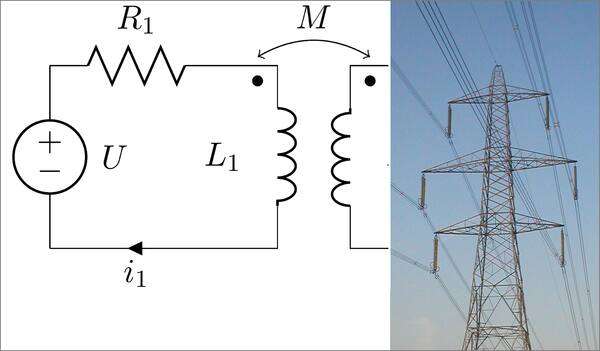- Basic components, voltage and current sources (independent and dependent). Ohm's law and Kirchhoff's laws. Analytical methods including in stages solution through simplifying, nodal analysis, superposition and graphical methods.
- Two pole equivalents (Thevenin and Norton equivalents).
- Power transfer matching.
- Operational amplifiers.
- Capacitors and coils.
- Transient phenomena and the step function.
- Equilibrium and continuity. Time signals of circuit quantities in dynamic circuits and in filter circuits.
- Alternating current analysed with the complex phasor method.
- Complex power, active, reactive and apparent power, powerfactor.
- Inductive coupling: mutual inductance and transformers.
- Three-phase system in the balanced and unbalanced cases.
- Applications and computer calculations.
EI1120 Electrical Circuit Analysis for the Environment and Energy Program 7.5 credits

Information per course offering
Information for Spring 2026 CENMI programme students
- Course location
KTH Campus
- Duration
- 13 Jan 2026 - 13 Mar 2026
- Periods
Spring 2026: P3 (7.5 hp)
- Pace of study
50%
- Application code
61347
- Form of study
Normal Daytime
- Language of instruction
Swedish
- Course memo
- Number of places
Places are not limited
- Target group
- No information inserted
- Planned modular schedule
- [object Object]
- Schedule
- Part of programme
Contact
Course syllabus as PDF
Please note: all information from the Course syllabus is available on this page in an accessible format.
Course syllabus EI1120 (Spring 2020–)Content and learning outcomes
Course contents
Intended learning outcomes
After completing the course with a passing grade the student should be able to:
- apply theories and methods in circuit analysis, and reproduce basic theorems and definitions of important concepts that are described in the course content
- solve parts of problems from the major part of the course content by setting up a calculation model and solve the problem analytically choose appropriate method; make proper approximations; formulate and solve necessary equations; evaluate the result in order to solve for quantities in linear electric circuits.
For higher grades, the student should in addition be able to, with progression in both completeness and scope, solve problems from the whole course content.
Literature and preparations
Specific prerequisites
Recommended prerequisites
Mathematics equivalent to that of the KTH education program 'Civilingenjörsutbildning i energi och miljö' (CENMI) years 1 and 2. Linear constant-coefficient ODEs, complex numbers in rectangular and polar form, complex conjugates and algebraic manipulation with complex symbolic variables, are all essential in the course, and therefore should be familiar skills at the start of the course.
Beyond these, linear algebra (matrix equations) and basic electrical knowledges (electric and magnetic fields, circuit quantities) can aid understanding of the subject's context, although they are not essential for studying and passing the course.
Literature
Examination and completion
Grading scale
Examination
- PRO2 - Project 2, 1.0 credits, grading scale: P, F
- PRO1 - Project 1, 1.5 credits, grading scale: P, F
- TEN1 - Examination, 5.0 credits, grading scale: A, B, C, D, E, FX, F
Based on recommendation from KTH’s coordinator for disabilities, the examiner will decide how to adapt an examination for students with documented disability.
The examiner may apply another examination format when re-examining individual students.
If the course is discontinued, students may request to be examined during the following two academic years.
Examiner
Ethical approach
- All members of a group are responsible for the group's work.
- In any assessment, every student shall honestly disclose any help received and sources used.
- In an oral assessment, every student shall be able to present and answer questions about the entire assignment and solution.
Further information
Course room in Canvas
Offered by
Main field of study
Education cycle
Supplementary information
In this course, the EECS code of honor applies, see: http://www.kth.se/en/eecs/utbildning/hederskodex.